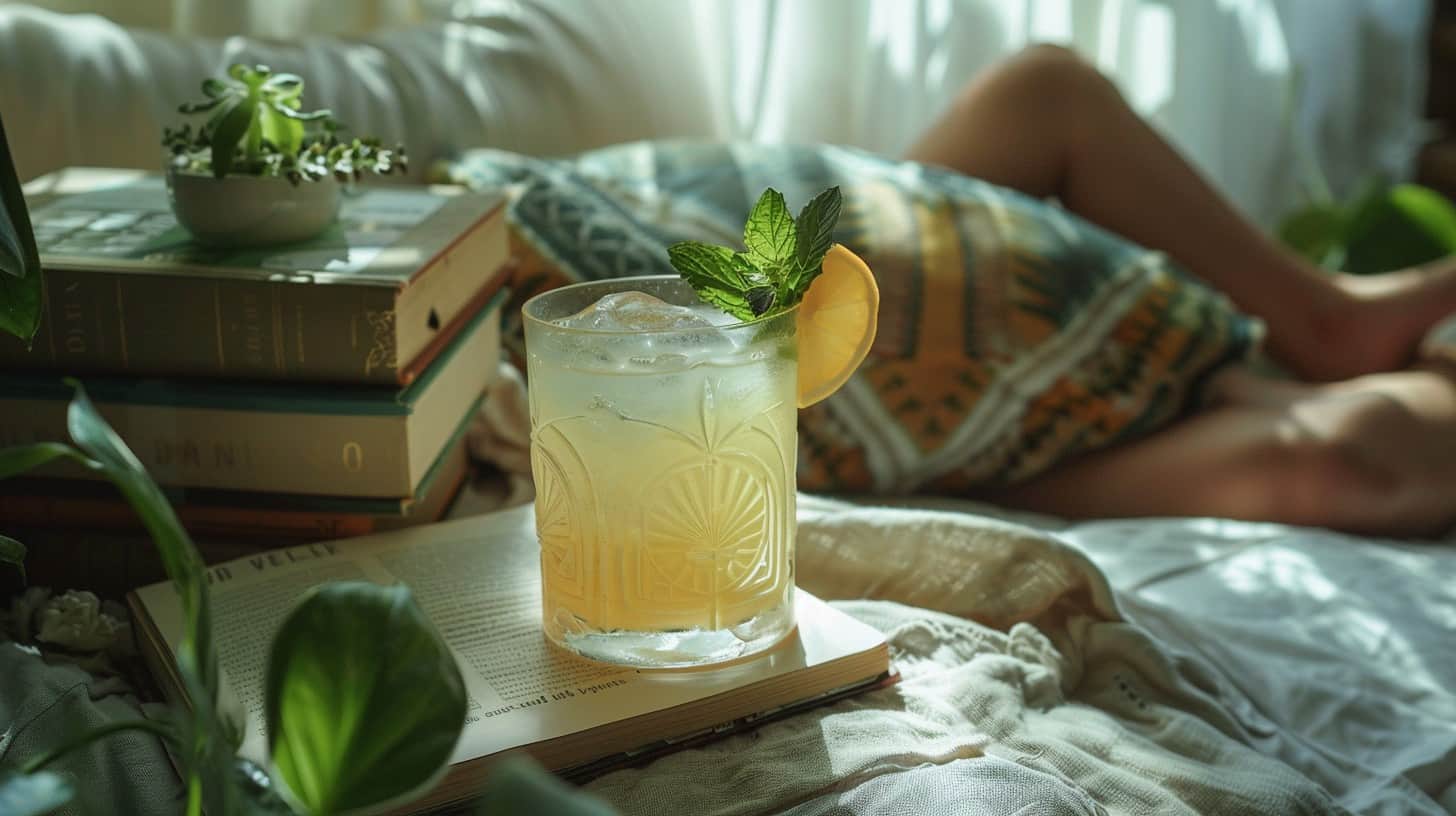Looking for calm without the bottle? You’re not alone. Alcohol might seem like a quick fix to chill out, but it’s a slippery slope—especially with its knack for messing up sleep and ramping up anxiety over time.
Good news: we’ve got a toolbox of eight alcohol-free strategies ready to help you relax and reclaim your zen. Ready to feel awesome? Keep reading.
Key Takeaways
Exercise is a great way to relax without alcohol. It releases endorphins, which fight stress and make you feel good.
Try Progressive Muscle Relaxation techniques to ease anxiety. Tense then relax different muscle groups to release tension.
Meditation and deep breathing can help calm your mind without needing a drink. Find a quiet place and focus on slow, belly breaths.
Get into hobbies or fun activities like yoga, painting, or hiking. These can distract you from stress and reduce the urge to drink.
Cut back on caffeine and switch to soothing drinks like herbal tea or homemade soda. This helps keep your mind clear and calm.
Table of Contents
Understanding Alcohol’s Impact on the Body
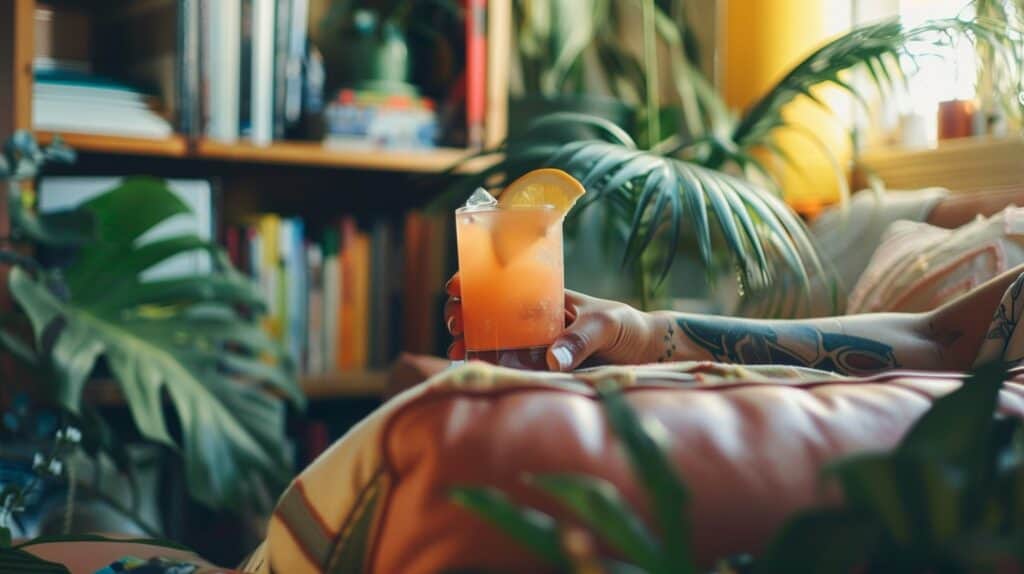
Moving on from the why, let’s talk about what happens when alcohol enters your system. Alcohol might seem like a friendly wingman at first, making you feel more relaxed in social settings or after a long day.
But it’s actually playing tricks on your body and mind. Drinking too much can mess with your sleep patterns, make you feel anxious or depressed the next day, and harm organs like your liver and heart over time.
Think of it as that friend who borrows money but never pays you back—fun to hang out with but bad for your wallet.
Your body sees alcohol as a foreign invader, putting all hands on deck to get rid of it through processes involving the liver—the body’s detox center. However, this vital organ can only process one drink per hour effectively.
So when you’re downing multiple drinks during game night or at happy hour, you’re giving your liver an overtime shift without extra pay. This constant overworking can lead to serious health issues such as high blood pressure and stroke.
It’s like forcing a car engine to run at full speed non-stop; eventually, parts start wearing out faster than they should.
Strategies for Relaxation Without Alcohol
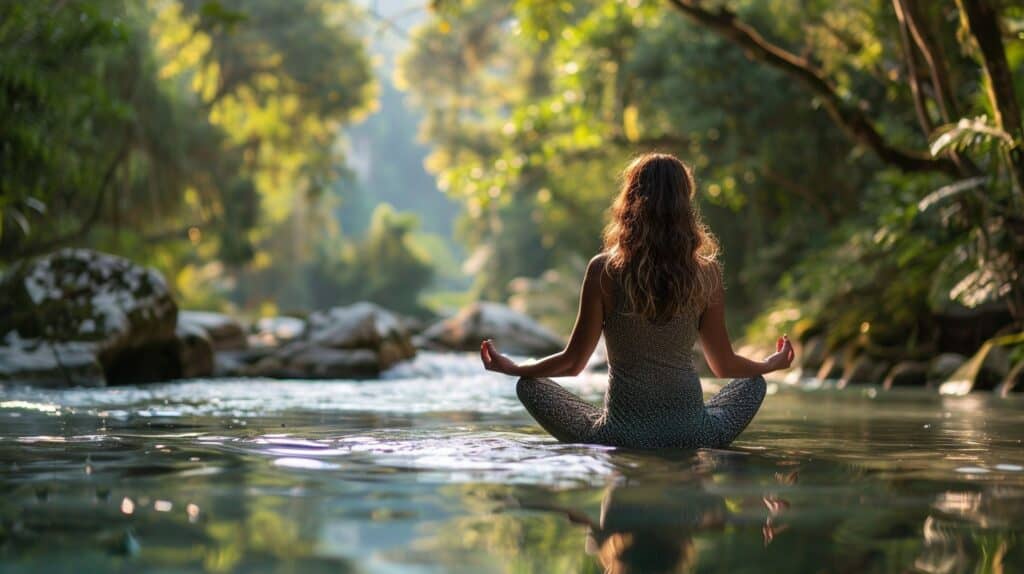
Kicking the booze doesn’t mean kicking back is off the table. In fact, there are plenty of ways to chill out without reaching for a drink. Think about it — when was the last time you tried something new to relax? Maybe it’s time we shake things up a bit.
Let’s dive into exercise first. It’s not just about getting sweaty and looking good; hitting the gym or even taking a brisk walk can blast away stress like nobody’s business. Your body gets to move, your mind gets a break, and those feel-good chemicals start dancing around in your brain.
Now, have you ever heard of progressive muscle relaxation? Picture yourself squeezing every ounce of tension out of your muscles, then letting it all go. Feels great, doesn’t it? This technique isn’t rocket science but works wonders for easing that tightness we carry around all day.
And hey, let’s talk breaths — meditation and deep breathing aren’t just for monks on mountains. A few deep breaths go a long way. But for some, incorporating a supplement like indica gummies might provide that extra nudge towards unwinding. Taking a moment for yourself, whether it’s through a calming activity or a little help from a gummy, is a step towards tranquility.
Exercise
Exercise — it’s not just for keeping your body in shape. It’s a powerhouse when you’re trying to chill out without reaching for a drink. Picture yourself lacing up those sneakers and hitting the pavement, or even lifting weights at the gym.
Your heart pumps, your muscles work, and bam — stress starts to fade away. This isn’t magic; it’s science. Working out releases endorphins, those feel-good chemicals that battle stress and pain.
Not into running or lifting heavy things? No problem. Try yoga, cycling, or swimming instead. These activities also kickstart endorphin production and can help clear your mind. And let’s not forget team sports — basketball, soccer, whichever floats your boat.
They’re fun ways to break a sweat and shake off the day’s worries with friends who’ve got your back. Now onto progressive muscle relaxation techniques – another tool in your relaxation arsenal.
Progressive Muscle Relaxation Techniques
After a good workout, another great way to let go of stress is through Progressive Muscle Relaxation techniques. These can really dial down anxiety and help you feel more chill. Here’s how to get started:
- Find a quiet spot. Grab a comfortable chair or lie down on your bed.
- Take a few deep breaths. Breathe in through your nose, hold it for a bit, and let it out through your mouth.
- Start with your feet – tighten the muscles as much as you can, then relax them. Feel the tension slip away like sand through your fingers.
- Move up to your legs. Same deal – tense them hard, then release all that pent-up energy.
- Don’t forget your gut! Pull it in tight, hold for a few seconds, then release.
- Now, clench those hands into fists as tight as steel, but let them go until they’re light as feathers.
- Time for the arms – make them stiff as boards, and then let that stiffness float away.
- Shoulders next – lift them up like you’re shrugging off a heavy cloak, then drop them down gently.
- Give some attention to your face too – squinch your facial muscles into a funny face and allow them to smooth back out into calmness.
Do these steps slowly and mindfully to nail the art of relaxation without any need for booze or other crutches like John Wick bourbon or those boozy ads promising false tranquility.
Mindfulness techniques aren’t just buzzwords; they’re tools increasingly recognized by wellness experts and even organizations devoted to mental health care such as Everyday Health, Inc., pointing toward their effectiveness in combating negative thoughts and emotions without leaning on alcohol.
Progressive muscle relaxation takes practice but stick with it! It’s like learning how to ride a bike – wobbly at first but smoother with time and effort.
Remember this: every minute you spend mastering these techniques brings you one step closer to handling stress like a pro…without reaching for that drink or feeling swayed by alcohol ads selling you an illusion of relaxation.
So instead of dwelling on stressors or triggers around job stress or everyday worries, take control with progressive muscle relaxation and breathe easier, knowing you’re building healthier coping strategies one muscle at a time.
Meditation and Deep Breathing Techniques
Meditation and taking deep breaths are like hitting the pause button on life’s remote. They help you chill without needing a drink.
- Find a quiet spot. Your room, a park, or even your car work great. Just make sure it’s somewhere you can be alone and undisturbed.
- Comfort is key. Sit or lie down in a way that doesn’t make your legs fall asleep or your backache. You’re going for relaxed, not ready for a yoga competition.
- Start with just five minutes. You don’t have to go all – in with half an hour of staring at the wall right away. Five minutes is perfect to begin.
- Focus on breathing from your belly, not your chest. This type of breathing helps slow down that racing heart and calms those jittery nerves.
- Close your eyes and picture something calm – a beach, mountains, or even floating on clouds works wonders.
- Counting helps keep focus. Try counting each inhale and exhale until you reach ten, then start back at one.
- If thoughts invade, and they will, gently push them aside like clouds drifting by… No need to get upset.
These simple steps can kickstart your journey towards finding peace without reaching for a bottle.
Turning stress into vapor without a sip of alcohol might sound like magic, but it’s all about knowing the tricks—next up: recreational activities that promise fun and relaxation sans the hangover.
Recreational Activities
Hitting the gym or playing sports can beat stress any day. It’s like hitting two birds with one stone—you get to stay fit and wave goodbye to tension. Ever tried yoga? It’s not just stretching; it’s finding your calm in the chaos.
Or maybe pick up a new hobby. Knitting isn’t just for grandmas, you know. It could be your ticket to relaxation town.
A trip to the great outdoors does wonders too. Take a walk in the park or hike up a trail. Nature has its way of making problems seem smaller, quieter. And if you’re into more artsy stuff, painting or dancing lets you express what words cannot sometimes say—perfect for shaking off those heavy feelings without reaching for a drink.
Now let’s grab our sneakers instead of that drink and dive into how reducing caffeine intake might just be another key to feeling zen without alcohol.
Reducing Caffeine Intake
After enjoying some fun activities, it’s time to look at what we put into our bodies. Cutting back on coffee and energy drinks helps keep the mind clear and calm. Too much caffeine can make you feel jittery or anxious, which is the opposite of relaxed.
Think of it as dialing down the body’s alarm system so you can chill out more easily.
Switching to juice or herbal tea can be a smart move. These beverages boost your mood without sending your heart racing. It’s about finding balance—enjoying the flavors you love without overdoing it on the stimulant front.
This way, winding down after a long day doesn’t hinge on that caffeine high, making relaxation more about choice than necessity.
Stretching
Stretching is your new best friend for kicking back without needing a drink. It’s not just an activity; it’s your ticket to feeling loose and free, minus the hangover. Just imagine easing into a stretch, feeling every tight spot in your body gently unwind.
No fancy equipment needed—just you and some open space.
This simple act does wonders beyond just loosening muscles—it quiets the mind too. Picture yourself after a long day, instead of reaching for a bottle, you reach towards your toes.
Feels good, right? Plus, it’s a healthy move that supports both your brain and body—keeping things like stress response and heart palpitations at bay while improving overall wellbeing.
So go ahead, give stretching a shot as part of your cool-down from life’s daily marathon.
Identifying and Addressing Triggers
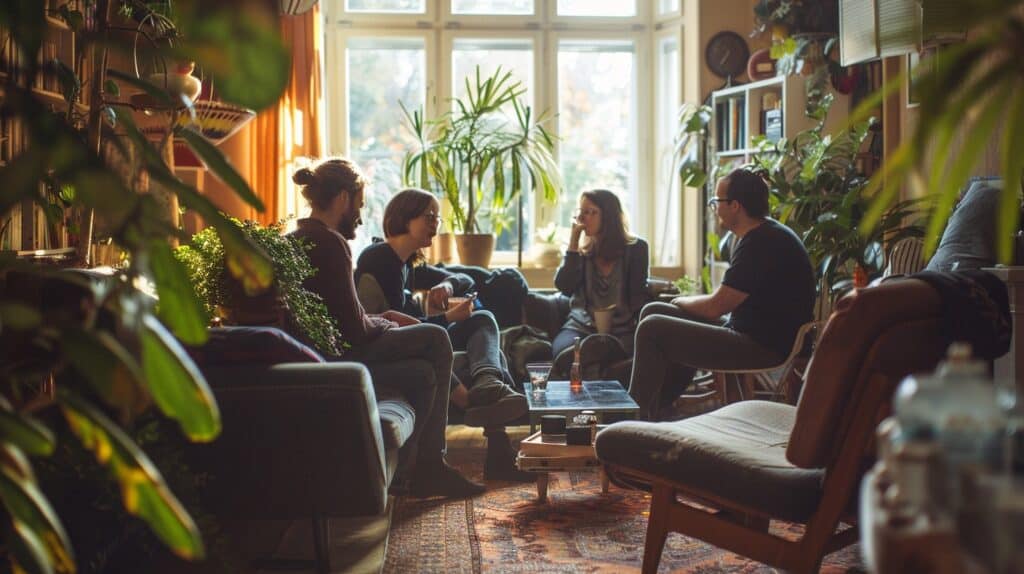
Finding out what makes you want to drink is key. It could be stress from work, fights at home, or even boredom. Once you know your triggers, dealing with them gets easier. Think of it like a game where knowing the opponent gives you an edge.
Talk about what bugs you. A chat with friends or family can lighten the load. Or try jotting down thoughts in a journal. When things get too heavy, online counseling might help sort things out without needing to step outside your door.
Finding hobbies that keep your mind and hands busy also works wonders – maybe building models or cooking up new recipes in the kitchen. It’s all about swapping old habits for fun distractions that leave no room for alcohol’s call.
Experimenting with Non-Alcoholic Drinks
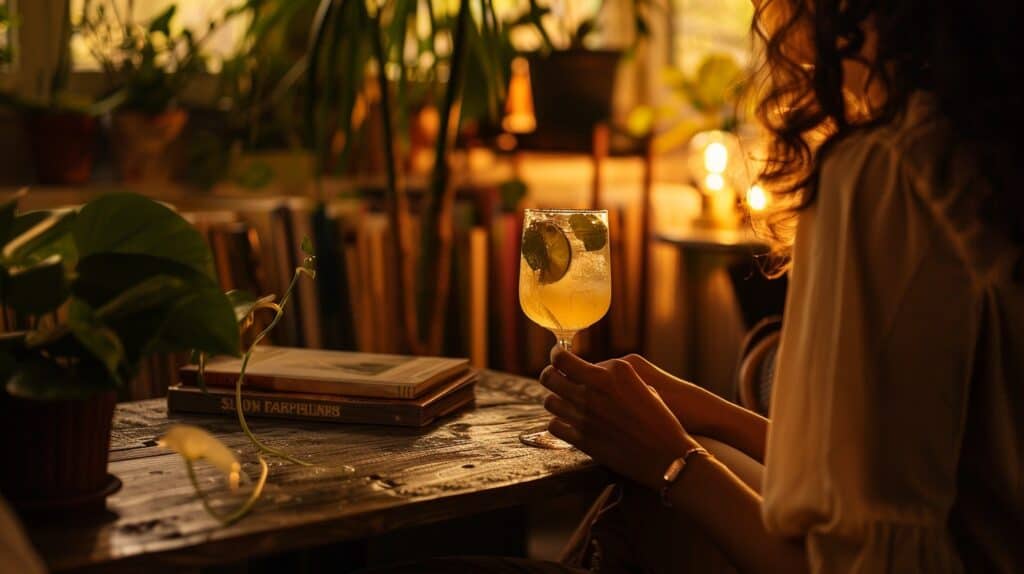
Switching gears to non-alcoholic beverages can be a game-changer. It’s like finding new flavors in your favorite song; you just need to know where to look.
- Dive into homemade soda. Mix sparkling water with a splash of your favorite fruit juice. Add a lime wedge for that extra zing.
- Craft non-alcoholic cocktails – or mocktails, as they’re affectionately known. Get creative with ingredients like fresh herbs, tonic water, and grenadine.
- Brew some decaf tea or coffee in the morning. It’s all about enjoying the ritual without the caffeine kick.
- Explore the world of herbal drinks. Drinks like chamomile tea can soothe your nerves without any alcohol.
- Try out sparkling cider instead of champagne for celebrations. It’s festive and keeps the party spirit alive, minus the hangover.
- Get fancy with infused waters… Cucumbers, berries, mint – toss them into your water bottle and let the magic happen over a few hours.
- Seek out specialty shops for exotic non-alcoholic beverages you’ve never tried before—like coconut water straight from a young coconut.
Let’s move on to how socializing and building support systems play their part…
Socializing and Support Systems
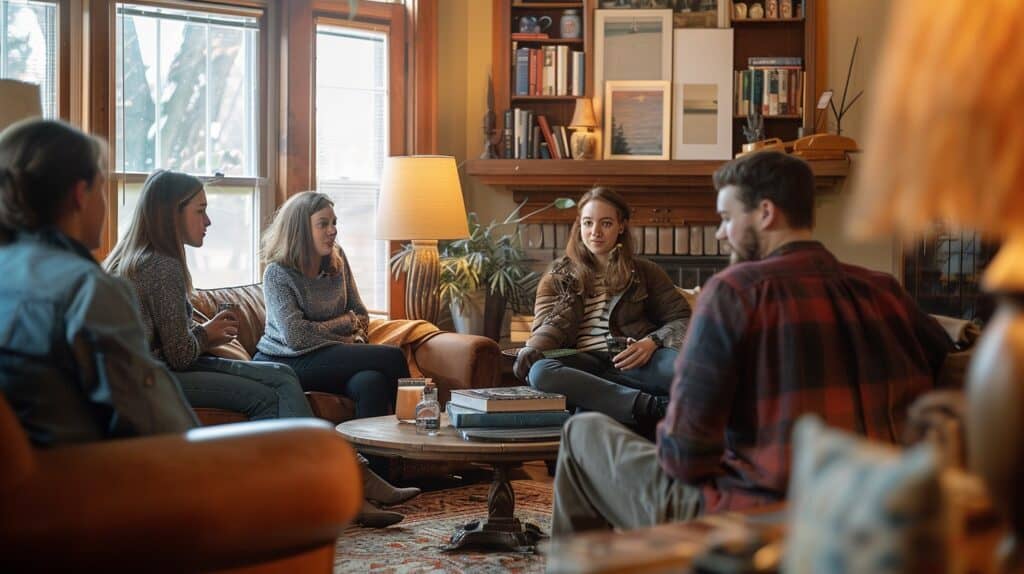
Hanging out with pals or joining a club might be what you need. It’s like having a team in your corner, always there to cheer you on and lend an ear when the going gets tough.
Spending Time with Friends
Kicking back with buddies does a lot more than just pass the time. It’s like hitting the refresh button after a long day—or week. You share laughs, maybe catch a game or grill in the backyard.
These moments aren’t just fun; they’re vital for your well-being, especially if you’re steering clear of alcohol. Being around people who get where you’re coming from makes everything seem manageable.
They’ve got your back, reminding you that you’re not treading water alone.
Getting together for activities—from hiking to trying out new cafés—keeps your mind off stress and steers clear of boredom’s trap. It’s all about building those connections that anchor you during rough seas.
Next up: diving into how hobbies and personal interests can play a big part in staying balanced without reaching for that drink.
Engaging in Group Activities
Joining a book club or sports team can break the monotony of everyday life. You get to meet new folks, share laughs, and learn something new. This combo is like hitting the jackpot for your brain’s happiness centers.
It keeps stress at bay and makes you feel part of something bigger.
Trying out group hobbies also opens doors to new friendships without needing a drink in hand. Whether it’s hiking through nature or strategizing in board games, these activities bring joy and relaxation.
They prove that fun times don’t need alcohol to be memorable. Now, let’s move on to understanding how seeking support when needed plays a crucial role in this journey.
Seeking Support When Needed
After you’ve tried joining friends for activities, sometimes you need more. Reaching out for help is a strong move, not a weak one. Online counseling and therapy are lifesavers for many battling alcohol addiction.
They offer a listening ear from someone who gets it, without judgement.
Friends and family are great, but professionals can dig deeper. They use tools like cognitive behavior therapy and motivational interviewing to really understand what’s going on inside your head.
Plus, group support systems like Alcoholics Anonymous provide a sense of community that makes you realize… you’re not in this boat alone.
FAQs About How to Relax Without Alcohol
Why should I think about relaxing without alcohol?
Well, turning to your stunning home bar after a long day might seem like a quick fix for stress. But here’s the scoop: the Centers for Disease Control and Prevention (CDC) say that too much can lead to some serious health issues, like depression or even becoming addicted. It’s like borrowing happiness from tomorrow – you’ll have to pay it back with interest.
Can working out really help me chill out?
Absolutely! Imagine your body is like a soda bottle, and stress shakes it up. Working out is like loosening the cap slowly – it lets out all that fizzy pressure in a safe way. Plus, you don’t need to run marathons; even simple exercises can make you feel more relaxed than a cat in the sun.
How does breathing exercises bring calmness?
Think of your breath as a remote control that can switch your brain from “panic mode” to “peace mode.” Breathing exercises are super easy – you can do them anywhere, anytime, no equipment needed! It’s like having an invisible superhero cape that helps fight off stress and worry.
Is journaling actually effective for managing stress?
Oh, yes! Journaling is like having a chat with your diary, instead of bottling everything up inside until you pop! When thoughts are racing around your head faster than kids chasing an ice cream truck, writing them down helps slow things down and makes problems seem less scary.
What’s this about using my five senses to relax?
This one’s cool because it’s all about paying attention to the little things around you – kind of like being Sherlock Holmes but for chilling out! Notice what you see, hear, smell, taste, and touch. It’s grounding – pulling you back from worrying about yesterday or tomorrow – keeping you in the ‘here’ and ‘now,’ enjoying life one sense at a time.
How important is sleep when trying not to rely on alcohol for relaxation?
Super important! Think of sleep as recharging your body’s batteries—without enough juice; everything feels harder than opening a jar with slippery hands. Trouble sleeping often walks hand-in-hand with excessive drinking, so finding new ways to wind down can help kick insomnia (and those pesky nighttime worries) right out of bed.

